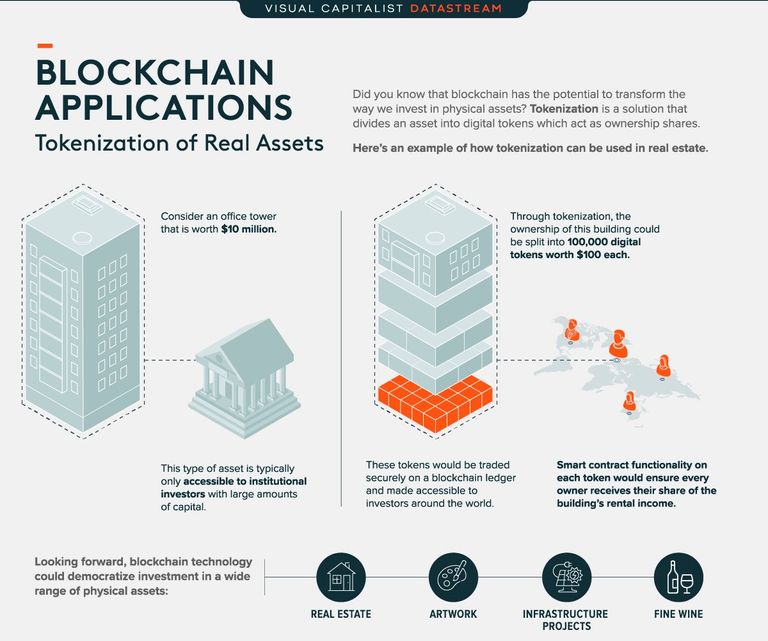
What Is Tokenization?
Tokenization refers to the conversion of real-world assets, such as real estate, artwork, commodities, or even intellectual property, into digital tokens that can be securely stored, transferred, and traded on a blockchain. Each token represents a direct ownership stake in the underlying asset, with tokenization allowing for the division of these assets into smaller, more easily tradable units.
For example, as a seller, a houseowner could tokenize ownership shares in their house and sell a portion of them in order to raise liquidity, making historically illiquid asset highly liquid instead. As a buyer, it also becomes much easier to make smaller investments and become an asset-owner. Given the soaring property prices across the world, this could give smaller investors a more accessible way to enter the real estate market.
Tokenization can be implemented in almost any real-world market today, including commodities, fine art, real estate, collectibles, shares, funds or even services. The exact asset tokenization process for various assets will be different on the type of asset and protocol being used. For example, fungible vs non-fungible, or digital-native vs off-chain.
Pros and Cons
Tokenization involves representing physical assets as digital tokens on a blockchain, which can lead to increased transparency, efficiency, and liquidity compared to traditional markets.
Tokenization allows assets like real estate, art, commodities, and more to be divided into smaller tradable units.
The advantages include increased liquidity, accessibility, transparency, lower settlement costs, and the potential for smart contract integration.
However, challenges include regulatory uncertainty, scalability and interoperability issues, security concerns, limited investor control, and ensuring proper backing of tokenized assets.
Despite challenges, tokenization has the potential to democratize investment, enhance market access, and transform various industries, such as real estate, fine art, intellectual property, and commodities.
Does it Have a Bright Future?
Tokenization has the potential to revolutionize the way we perceive and invest in assets.
By creating digital representations of real-world assets on blockchain, it can democratize ownership, open up opportunities for smaller investors, and increase liquidity.
It has the benefits of transparency, efficiency, and reduced costs that blockchain and smart contracts bring to this process.
However, the challenges mentioned, especially regulatory uncertainties and security concerns, are significant hurdles that need to be addressed.
Regulatory frameworks need to catch up to the technological advancements to ensure investor protection and asset legitimacy. Additionally, while tokenization is well-suited for certain asset types, those involving physical verification (like commodities) require careful design to prevent counterfeiting and maintain integrity.
Future Impact
Tokenization is a transformative concept, but its widespread adoption might take time due to regulatory and technical complexities.
As regulatory clarity improves and technical solutions for scalability and security are developed, we can expect more real-world industries to embrace tokenization.
Tokenization could democratize investment opportunities, making traditionally exclusive markets accessible to a wider range of investors.
The integration of tokenized assets with smart contracts and decentralized finance (DeFi) could reshape how financial services and products are structured and accessed.
While the journey toward comprehensive asset tokenization might be gradual, it holds immense potential to reshape financial markets and ownership paradigms across various sectors.
The collaboration between technological innovation, regulatory clarity, and industry adoption will be key in realizing this potential.
Harry Potter Library (HPL) Community
Please join the HPL community. I will upvote all members' posts. Simply join and post there using the tags "hpl" or "harrypotterlibrary" in your post.
- Community Address: https://steemit.com/trending/hive-140602
- About HPL Community:
EN: Harry Potter Library - HPL
KR: 해리포터의 도서관 (Harry Potter Library, HPL)